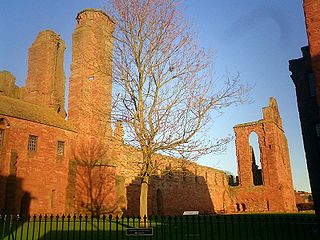
Arbroath Abbey, in the Scottish town of Arbroath, was founded in 1178 by King William the Lion for a group of Tironensian Benedictine monks from Kelso Abbey. It was consecrated in 1197 with a dedication to the deceased Saint Thomas Becket, whom the king had met at the English court. It was William's only personal foundation — he was buried before the high altar of the church in 1214.

The Stone of Scone, is an oblong block of red sandstone that was used in the coronation of Scottish monarchs until the 13th century, and thereafter in the coronation of English and later British monarchs. The Stone measures 26 by 16.7 by 10.5 inches and weighs approximately 335 lb. A cross is roughly incised on one surface, and an iron ring at each end aids with transport. Monarchs sat on the Stone of Scone itself until a wooden platform was added to the Coronation Chair in the 17th century.
The Glasgow University Scottish Nationalist Association (GUSNA) is a student organisation formed in 1927 at the University of Glasgow which supports Scottish independence.
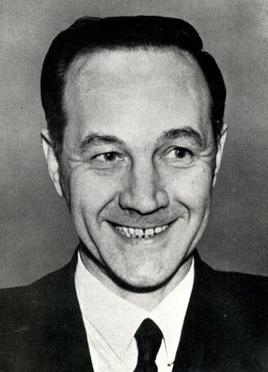
John MacDonald MacCormick was a Scottish lawyer, Scottish nationalist politician and advocate of Home Rule in Scotland.
Ian Robertson Hamilton KC was a Scottish lawyer and nationalist, best known for his part in the return of the Stone of Destiny from Westminster Abbey to Arbroath Abbey in 1950.
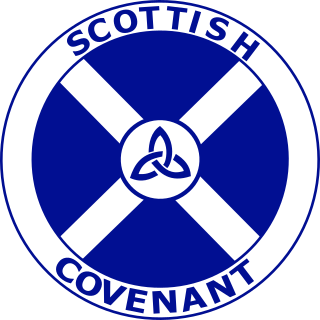
The Scottish Covenant Association was a non-partisan political organisation in Scotland in the 1940s and 1950s seeking to establish a devolved Scottish Assembly. It was formed by John MacCormick who had left the Scottish National Party in 1942 when they decided to support all-out independence for Scotland rather than devolution as had been their position.

The Coronation Chair, also known as St Edward's Chair or King Edward's Chair, is an ancient wooden chair on which British monarchs sit when they are invested with regalia and crowned at their coronations. It was commissioned in 1296 by King Edward I to contain the Stone of Scone, which he had captured from the Scots. The chair was named after Edward the Confessor and for centuries it was kept in his shrine at Westminster Abbey. The Coronation Chair was last used at the Coronation of King Charles the III and Queen Camilla at Westminster Abbey in 2023.

Kate Rooney Mara is an American actress. She is known for work in television, playing reporter Zoe Barnes in the Netflix political drama House of Cards, computer analyst Shari Rothenberg in the Fox thriller series 24 (2006), wronged mistress Hayden McClaine in the FX miniseries American Horror Story: Murder House (2011), Patty Bowes in the first season of the FX drag ball culture drama series Pose (2018), and a teacher who begins an illicit relationship with an underage student, in the FX miniseries A Teacher (2020). For the latter, she received an Independent Spirit nomination for Best New Scripted Series as an executive producer.

Scone Abbey was a house of Augustinian canons located in Scone, Perthshire (Gowrie), Scotland. Dates given for the establishment of Scone Priory have ranged from 1114 A.D. to 1122 A.D. However, historians have long believed that Scone was before that time, the centre of the early medieval Christian cult of the Culdees. Very little is known about the Culdees but it is thought that they may have been worshiping at Scone from as early as 700 A.D. Archaeological surveys taken in 2007 suggest that Scone was a site of real significance even prior to 841 A.D., when Kenneth MacAlpin brought the Stone of Destiny, Scotland's most prized relic and coronation stone, to Scone.
The Westminster Stone theory is the belief held by some historians and scholars that the stone which traditionally rests under the Coronation Chair is not the true Stone of Destiny but a 13th-century substitute. Since the chair has been located in Westminster Abbey since that time, adherents to this theory have created the title 'Westminster Stone' to avoid confusion with the 'real' stone.
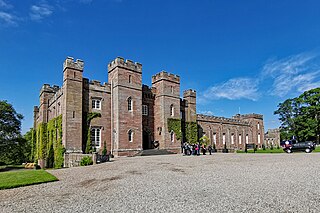
Scone is a town in Perth and Kinross, Scotland. The medieval town of Scone, which grew up around the monastery and royal residence, was abandoned in the early 19th century when the residents were removed and a new palace was built on the site by the Earl of Mansfield. Hence the modern village of Scone, and the medieval village of Old Scone, can often be distinguished.
Òran na Cloiche is a Scottish Gaelic song, written by poet Donald MacIntyre, also known as the Paisley Bard. It celebrates the return of the Stone of Destiny to Scotland, which was retrieved from Westminster Abbey on Christmas Day, 1950 by students. A fierce lifetime supporter of the nationalist cause, the bard wrote the 25 verse song in a single sitting immediately upon hearing the news of the stone's return, and some of the students involved visited him at his home to congratulate him on the song's composition in the weeks following. While Òran na Cloiche is sung to the tune of a fast reel, and is celebratory and exhilaratory in tone; upon hearing the news of the stone's return to England, the bard composed an accompanying lament, titled "Nuair Chaidh a' Chlach a Thilleadh" to express his disgust.
Gavin Harold Russell Vernon was a Scottish engineer who along with his accomplices, removed the Stone of Scone from Westminster Abbey in London on Christmas Day 1950 and took the Stone to Scotland.
On 25 December 1950, four Scottish students from the University of Glasgow removed the Stone of Scone from Westminster Abbey in London and took it back to Scotland. The students were members of the Scottish Covenant Association, a group that supported home rule for Scotland. In 2008, the incident was made into a film called Stone of Destiny. It seems likely that the escapade was based on the fictional account of a plot by Scottish Nationalists to liberate the Stone of Destiny from Westminster Cathedral and to return it to Scotland, as told in Compton Mackenzie's novel The North Wind of Love Bk.1, published six years earlier in 1944.
Events from the year 1951 in Scotland.
Events from the year 1928 in Scotland.
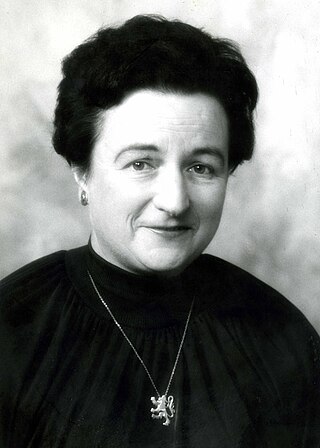
Kay Matheson was a Scottish teacher, political activist, and Gaelic scholar. She was one of the four University of Glasgow students involved in the 1950 removal of the Stone of Scone.
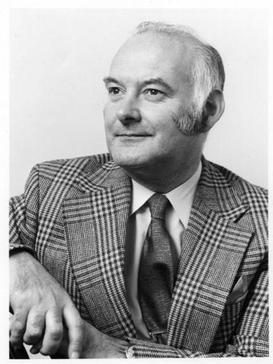
Thomas Ronald Leslie Fraser was a Scottish writer, broadcaster and Liberal Party politician. He was notable for standing as a candidate for the United Kingdom parliament, even though he was too young to be eligible to vote.
Robert Gray, often known as Bertie Gray, was a Scottish nationalist politician.










